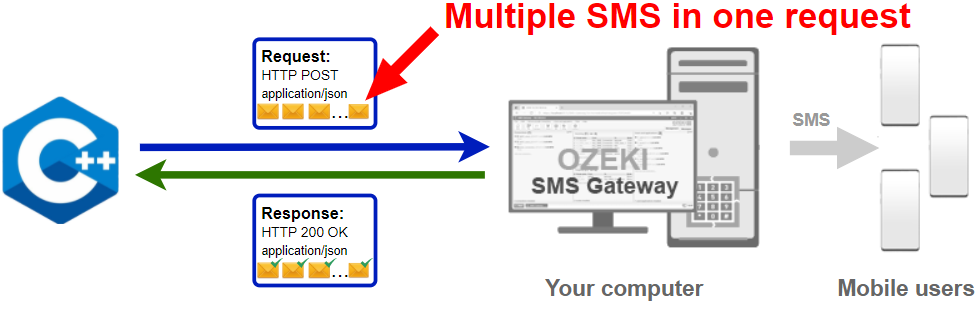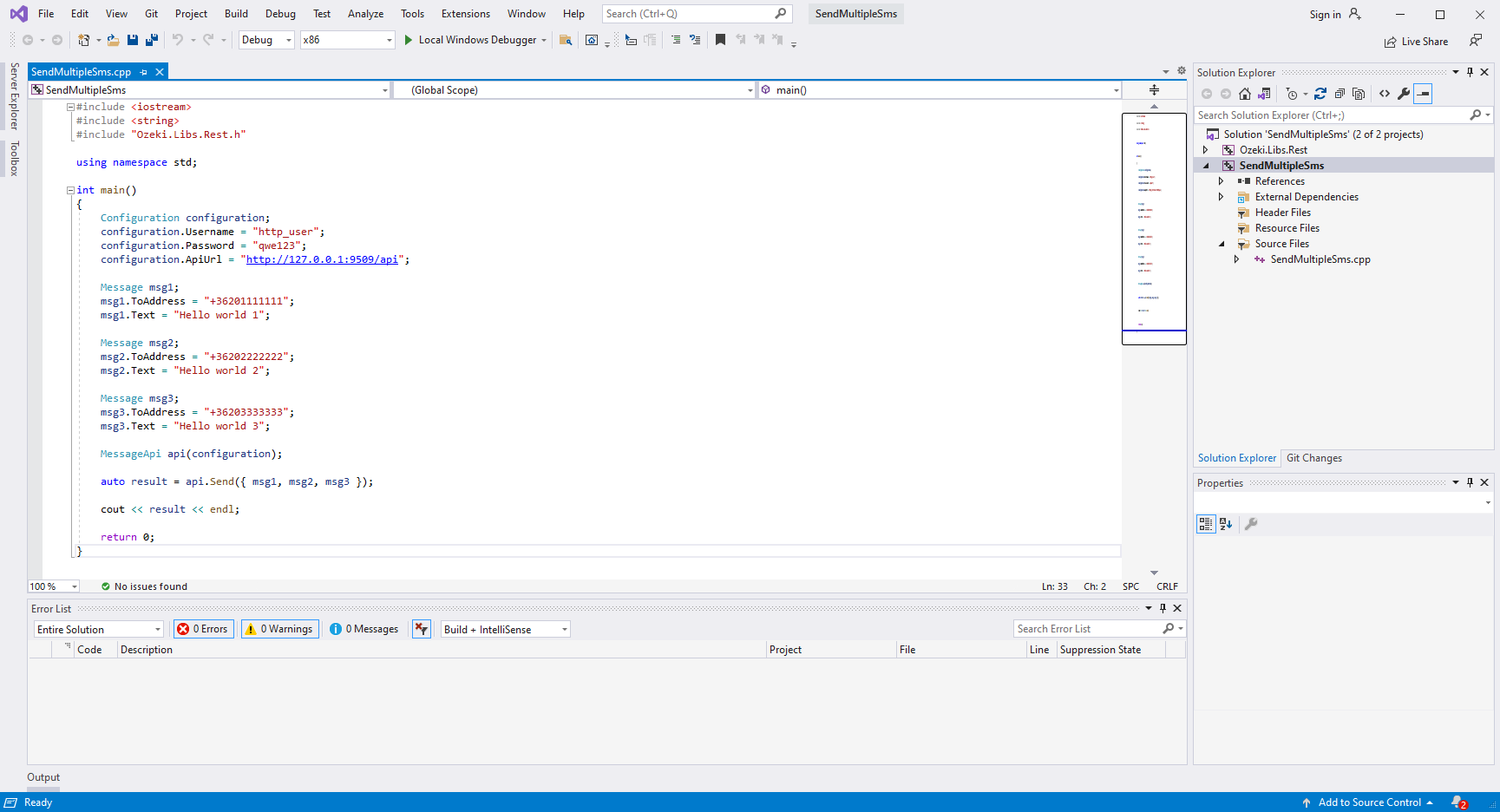How to send multiple sms from C/C++
The simplest way to send SMS from C/C++ is to use the built in HTTP/Rest SMS api of Ozeki SMS Gateway. When you use this API, you will send SMS messages by issuing a HTTP Post request to the SMS gateway. The HTTP Post request will contain a message formatted in json format. The SMS gateway will send this SMS to the recipient phone, and it will return a HTTP 200 OK response to your request.

C/C++ code to send multiple sms to mobile
The C/C++ sms code sample below demonstrates how you can send SMS using the http rest sms api of Ozeki SMS Gateway using the C/C++ Ozeki.Libs.Rest library. This library is provided to you free of charge, and you may use it and modify it in any of your projects.
SendMultipleSms.cpp
#include <iostream>
#include <string>
#include "Ozeki.Libs.Rest.h"
using namespace std;
int main()
{
//Function to create unique identifier for each messages
srand((unsigned)time(0));
Configuration configuration;
configuration.Username = "http_user";
configuration.Password = "qwe123";
configuration.ApiUrl = "http://127.0.0.1:9509/api";
Message msg1;
msg1.ToAddress = "+36201111111";
msg1.Text = "Hello world 1";
Message msg2;
msg2.ToAddress = "+36202222222";
msg2.Text = "Hello world 2";
Message msg3;
msg3.ToAddress = "+36203333333";
msg3.Text = "Hello world 3";
MessageApi api(configuration);
auto result = api.Send({ msg1, msg2, msg3 });
cout << result << endl;
return 0;
}
How to use the C/C++ sms example:
This C++ sms example can be used in any C/C++ application. To use it, you must add the Ozeki.Libs.Rest dll as a reference to your project. After the project reference is added, you must put the using Ozeki.Libs.Rest; directive into the header section of your C/C++ source code. This will allow you to use the classes provided by the Ozeki.Libs.Rest library. You can use the Message class to create the SMS. You can use the MessageApi class to send the SMS to the SMS gateway. The SMS gateway will forward your message to the mobile network either through a wireless connection or through the Internet.
Download SendSms.cpp
The source code explained in this article can be downloaded and used and modified free of charge.
Download: SendMultipleSms.cpp.zip (2.97Mb)
What is in the SendMultipleSms.cpp file?
The SendMultipleSms.cpp file contains the Ozeki.Libs.Rest library, which gives you all the tools necessary to send and receive SMS messages. You will also find the SendMultipleSms project in the zip, which contains the example code to show you how to send an SMS. This example code is listed below.

How to send multiple sms from C/C++ (Quick steps)
To send multiple sms from C/C++:
- Setup Visual Studio Community
- Download the SendMultipleSms.cpp.zip file
- Extract the .zip file from Downloads folder
- Open the sendsms.sln file in Visual Studio
- Launch Ozeki SMS Gateway
- Create a HTTP API user in Ozeki
- Run SendMultipleSms.cpp C/C++ code in Visual Studio to send test SMS
- Check the Sent box in Ozeki SMS Gateway
Install Ozeki SMS Gateway and create an HTTP API user
To be able to send SMS from C/C++, first you need to install Ozeki SMS Gateway. The SMS gateway can be installed on the same computer, where you develop your C/C++ code in Visual studio. After installation, the next step is to connect Ozeki SMS Gateway to the mobile network. You can send a test sms from the Ozeki GUI to verify, that your mobile network connection works. The final step to prepare your environment is to create a HTTP sms api user. Create a user with a username of "http_user", and with a password of "qwe123" to make the example work without modification.
After the environment is setup, you can run your C/C++ code.
HTTP API url to use send sms from C/C++
To send SMS from C/C++, your C/C++ will have to issue an HTTP request to the SMS gateway. The API url is shown below. Note that the IP address (127.0.0.1) should be replaced to the IP address of your SMS gateway. If Ozeki SMS Gateway is installed on the same computer where the C/C++ sms application is running, this can be 127.0.0.1. If it is installed on a different computer, it should be the IP address of that computer.
http://127.0.0.1:9509/api?action=rest
HTTP authentication to use send sms from C/C++
To authenticate the C/C++ sms client, you need to send the username and password in a base64 encoded string to the server in a HTTP request. The format used is: base64(username+":"+password). In C# you can use the following code to do this encoding:
string usernamePassword = username + ":" + password; string usernamePasswordEncoded = base64::encode(usernamePassword); return "Basic " + usernamePasswordEncoded;
For example, if you encode the username 'http_user' and the password 'qwe123', you will get the following base64 encoded string: aHR0cF91c2VyOnF3ZTEyMw==. To send
HTTP request header to send SMS from C/C++
To send the SMS messages, you need to include the following lines as headers in the HTTP request. Note that we include a content type and an Authorization header.
Content-Type: application/json Authorization: Basic QWxhZGRpbjpvcGVuIHNlc2FtZQ==
HTTP request to send SMS from C/C++
To submit the SMS, your C/C++ application will send an HTTP request similar to the one below. Note, that this request contains a HTTP header part and a http body part. The HTTP body is a JSON encoded data string. It contains the recipient's number and the message's text.
POST /api?action=sendmsg HTTP/1.1
Content-Length: 935
Content-Type: application/json
Accept: application/json
Authorization: Basic aHR0cF91c2VyOnF3ZTEyMw==
Host: 127.0.0.1:9509
{
"messages": [
{
"create_date": "2021-06-29T08:40:11",
"message_id": "rde8491s-5wpt-am95-bxsh-vu1a8kns10et",
"submit_delivery_requested": true,
"submit_report_requested": true,
"submit_view_requested": true,
"text": "Hello world 1",
"time_to_send": "2021-06-29T08:40:11",
"to_address": "+36201111111",
"valid_until": "2021-07-06T08:40:11"
},
{
"create_date": "2021-06-29T08:40:11",
"message_id": "qxhm3cuw-kwqb-mldi-b0xb-vn8sfway1hs2",
"submit_delivery_requested": true,
"submit_report_requested": true,
"submit_view_requested": true,
"text": "Hello world 2",
"time_to_send": "2021-06-29T08:40:11",
"to_address": "+36202222222",
"valid_until": "2021-07-06T08:40:11"
},
{
"create_date": "2021-06-29T08:40:11",
"message_id": "hnvcmp4j-a303-4432-psok-txujv54w8wrg",
"submit_delivery_requested": true,
"submit_report_requested": true,
"submit_view_requested": true,
"text": "Hello world 3",
"time_to_send": "2021-06-29T08:40:11",
"to_address": "+36203333333",
"valid_until": "2021-07-06T08:40:11"
}
]
}
HTTP response received by the C/C++ sms example
Once the SMS gateway receives this request, it will generate a HTTP response. The HTTP response will contain a status code, to indicate whether the SMS submit request was successful or not. It will also return a JSON encoded structure to provide you useful details about the message's submission.
HTTP/1.1 200 OK
User-Agent: OZEKI 10.3.123 (www.myozeki.com)
Content-Type: application/json; charset=utf8
Last-Modified: Tue, 29 Jun 2021 08:36:20 GMT
Server: 10/10.3.123
Transfer-Encoding: chunked
{
"http_code": 200,
"response_code": "SUCCESS",
"response_msg": "Messages queued for delivery.",
"data": {
"total_count": 3,
"success_count": 3,
"failed_count": 0,
"messages": [
{
"message_id": "rde8491s-5wpt-am95-bxsh-vu1a8kns10et",
"from_station": "%",
"to_address": "+36201111111",
"to_station": "%",
"text": "Hello world 1",
"create_date": "2021-06-29 08:40:11",
"valid_until": "2021-07-06 08:40:11",
"time_to_send": "2021-06-29 08:40:11",
"submit_report_requested": true,
"delivery_report_requested": false,
"view_report_requested": false,
"tags": [
{
"name": "Type",
"value": "SMS:TEXT"
}
],
"status": "SUCCESS"
},
{
"message_id": "qxhm3cuw-kwqb-mldi-b0xb-vn8sfway1hs2",
"from_station": "%",
"to_address": "+36202222222",
"to_station": "%",
"text": "Hello world 2",
"create_date": "2021-06-29 08:40:11",
"valid_until": "2021-07-06 08:40:11",
"time_to_send": "2021-06-29 08:40:11",
"submit_report_requested": true,
"delivery_report_requested": false,
"view_report_requested": false,
"tags": [
{
"name": "Type",
"value": "SMS:TEXT"
}
],
"status": "SUCCESS"
},
{
"message_id": "hnvcmp4j-a303-4432-psok-txujv54w8wrg",
"from_station": "%",
"to_address": "+36203333333",
"to_station": "%",
"text": "Hello world 3",
"create_date": "2021-06-29 08:40:11",
"valid_until": "2021-07-06 08:40:11",
"time_to_send": "2021-06-29 08:40:11",
"submit_report_requested": true,
"delivery_report_requested": false,
"view_report_requested": false,
"tags": [
{
"name": "Type",
"value": "SMS:TEXT"
}
],
"status": "SUCCESS"
}
]
}
}
C/C++ sms example: SendMultipleSms.sln
In this video, we are going to show you how you can send multiple SMS messages using the example project we provided in the tutorial page. The video will start with downloading the example project and will end with running the code. The video is short but very easy to follow. You will have no problem following the tutorial. If you are familiar with C/C++, feel free to modify the variables in the code to send a customized message to customized addresses.
The example code below is part of the SendMultipleSms.sln Visual Studio Solution. A visual studio solution can contain multiple projects and multiple files. In this solution there is only one project: SendMultipleSms.vcxproj, and one file: SendMultipleSms.cs.

How to use the example project (Video tutorial)
In the following video, you will learn how to run the code and how to check the results. First, the video is going to show you how to run the code. Then you will see how to check the Sent folder of the HTTP user. At the end of the video, you will see the details of a sent message. The video is only 46 seconds long and it contains all the important steps and information you need to complete the process.
Final thoughts
This guide contains all the fundamental information on how to send multiple SMS messages from C / C++ with the Ozeki SMS Gateway's HTTP REST SMS API. You will find using this solution very beneficial because the C / C++ SMS API works with the Android SMS Gateway besides the online SMS service providers that allow you to send SMS wirelessly. This service allows you to deliver valuable information to more than one mobile phone at once, that way it makes your messaging more dynamic.
Go ahead and learn more now! You can find many more documents like this on the Ozeki website. You can use C / C++ SMS APIs with other functionalities, check out How to schedule an SMS in C/C++.
Put into practice what you have learned, firstly download Ozeki SMS Gateway!
